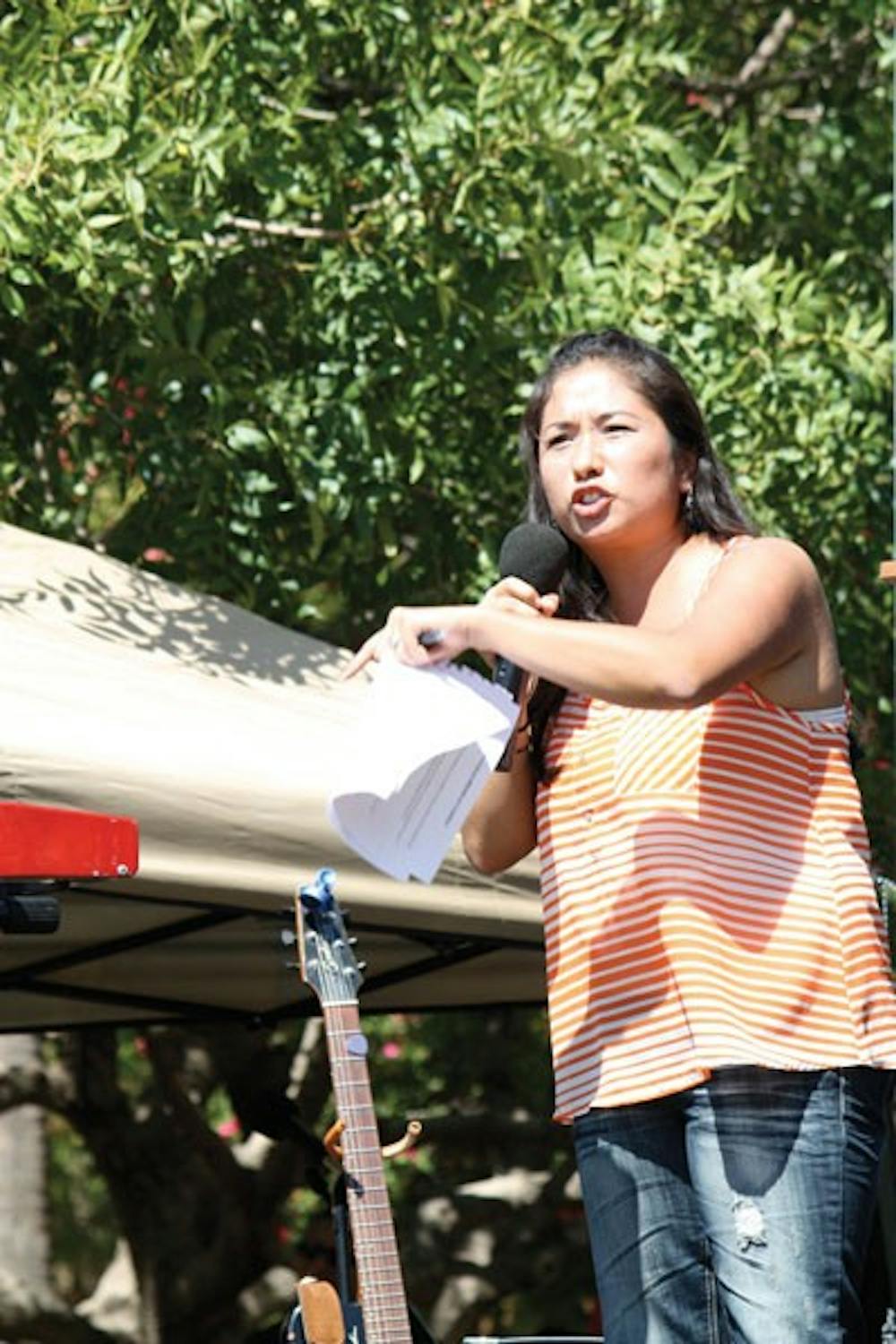Dulce Matuz has never been able to work as an engineer since graduating from ASU in 2009. She has never voted and she didn’t have a driver’s license for more than 10 years.
Matuz, who spoke Wednesday at a rally for Libertarian presidential candidate Gary Johnson, is the president of the Arizona Dream Act Coalition and was named one of TIME Magazine’s most influential people of 2012.
“When I heard about (the recognition), I felt so honored but I also realized it wasn’t about me,” she said. “The recognition was for the entire movement.”
When Matuz moved to California from Hermosillo, Mexico, she was 15 years old and knew very little English.
Rosa Maria Soto, Matuz’s mother, said she overcame the language barrier quickly.
“Dulce often felt frustrated because she couldn’t speak English well,” Soto said in Spanish. “But she was determined to learn (and) she even took up extra lessons.”
 'When I drove to ASU, I had to worry I would be deported,' said Dulce Matuz, an ASU graduate who was named one of TIME's most influential people of 2012, on Hayden Lawn when she spoke about the DREAM Act on Wednesday afternoon. (Photo by Cameron Tattle)
'When I drove to ASU, I had to worry I would be deported,' said Dulce Matuz, an ASU graduate who was named one of TIME's most influential people of 2012, on Hayden Lawn when she spoke about the DREAM Act on Wednesday afternoon. (Photo by Cameron Tattle)Matuz said she had never thought about attending a university until she joined a robotics team at Carl Hayden Community High School in Phoenix.
“I learned that determination beats ability any time,” she said. “I learned that, no matter what background, I could still be successful.”
Soto said Matuz’s admittance to the University was difficult because of her legal status.
“I used to go with her to ASU so she could talk to people and try to get some financial help,” Soto said. “We knew we wouldn’t be able to pay for tuition unless she got a scholarship.”
Matuz’s work in robotics earned her a For Inspiration and Recognition of Science and Technology scholarship that paid for her first two years at ASU.
After Proposition 300, which prevents university students from receiving financial aid if they cannot prove their legal status in the country, passed in 2008, Matuz started working with other undocumented students to look for solutions.
“If there was anything positive about Proposition 300, (it) is that we were able to meet other undocumented students,” Matuz said. “After that, we saw people coming out of the shadows and telling their stories.”
Matuz was part of a group of undocumented students who decided to form ADAC, an organization that works toward the passage of DREAM Act.
“We want to make a positive change,” she said. “We want to fix our broken immigration system.”
Matuz and her husband, Daniel Palomino, met at Noble Science Library when they were both students.
He said he has admired her work from the start.
“I see what she does every day and I feel proud,” he said. “We need more people like Dulce.”
Palomino said he supports Matuz’s activism but sometimes feels concerned.
“In an area like Arizona, I can’t help but be scared for her safety from time to time,” he said.
Matuz has sacrificed a lot to dedicate herself fully to ADAC and she will be successful, Palomino said.
President Barack Obama’s new immigration policy is a step in the right direction, Matuz said.
“(Deferred action) is giving us an opportunity to be able to use our skills,” she said.
Arizona’s controversial immigration law Senate Bill 1070 can be repealed, Matuz said.
“We know there’s going to be racial profiling and we need to document it,” she said. “That’s going to give us the ammunition to take it down.”
The greatest act of civil disobedience is getting an education, she said.
“I believe in a tolerant America where my legal status is no barrier to my success,” she said during the rally.
Matuz said she loves the country and is an American.
“I am an American without papers,” she said. “The only thing separating us … is (a social security) number.”
Lorenzo Santillan, an active ADAC member, went to the same high school as Matuz.
“I’d heard of her and her work in robotics,” he said. “She was like my role model without ever meeting her.”
Her work as president of ADAC has been impeccable, Santillan said.
“She speaks for us, she raises money, she does interviews,” he said. “And she still has time to give us great advice and help us grow as persons.”
Matuz recently obtained conditional residency for two years because her husband is a citizen.
“Even though I’m no longer undocumented, I’m still a DREAMer,” she said.
Reach the reporter at dpbaltaz@asu.edu




